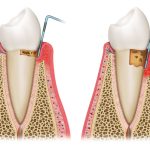
The majority of adults in the western world show some signs of gum disease, even if they’re only minor. Many of these people will have no idea about it, as mild gum disease is unlikely to cause discomfort and has few symptoms, but around one in ten people will develop more serious gum disease at some point in their lives, and the results of this can be far more damaging.
Gum disease, how it starts and what it becomes
Mild gum disease is more properly called gingivitis, and often goes unnoticed. The only symptoms normally experienced are swollen or reddened gums, which might bleed if they’re irritated when you brush your teeth. This stage of infection isn’t too much of a worry in itself.
However, if left untreated, the problem may well develop into more serious gum disease, a condition known as periodontitis. This is the point at which pain will appear, with bad breath and a constant unpleasant taste in the mouth also possible. If allowed to reach this point, the infection may even spread to the tissues that keep your teeth and gums firmly connected, causing gaps to appear beneath your teeth. This will make your teeth loose and there’s a chance of the gaps filling with pus. Your teeth may even fall out if you ignore the symptoms.
What are the risks of untreated gum disease?
There are several external risk factors that will greatly increase your chances of gum disease: smoking and diabetes will both put you at a higher risk, as will poor oral hygiene or an impaired immune system (perhaps as a result of taking certain prescription drugs). If you fall into any of these categories, it’s particularly important for you to keep an eye out for the symptoms of gum disease so that you can stop it in its tracks.
How is gum disease treated?
The treatment of gingivitis generally involves little more than regular and thorough brushing and flossing, and perhaps antiseptic mouthwash, although ideally this would be avoided as some mouthwashes will stain your teeth brown. Periodontitis can’t be treated from home and requires specialist care: one or more visits to the dentist will be necessary, so make absolutely sure that any gingivitis isn’t allowed to go unchecked.
What is the greatest cause of gum disease?
The prime cause of gum disease is dental plaque, a soft deposit on the teeth that most people will be familiar with. This plaque poses a threat because of the plethora of harmful bacteria it contains, which can lead to the infection and inflammation of the tissue in which the teeth are embedded.
Fortunately, this means that preventing gum disease shouldn’t be a difficult task. Brushing your teeth twice a day, for at least two minutes each time, is vitally important, and many dentists recommend using an electric toothbrush to get the best possible results. Flossing after brushing is also a good idea, as this cleans between your teeth far more effectively than brushing alone, and can help to prevent plaque from building up in the gaps.
Regular check-ups at the dentists are also advisable, so that they can let you know if you’re showing any warning signs and give you advice on what to do. You can’t go too far wrong if you follow this advice, and making oral hygiene a priority can save you from a lot of pain and discomfort in the future, both physical and as a result of the inevitable medical bills!


